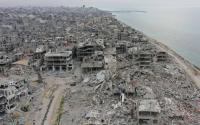Turkey's media law strengthens the Dogan Group's hand - and tightens controls on free expression 3 June 2002 / Vol. 159, No. 22BY MARYANN BIRD
Aydin Dogan wants to make one thing perfectly clear. "All I want is transparency," says the Turkish media magnate. "I want for my country exactly the same conditions as there are in the West." His words, spoken after parliament approved a complex and harsh new media law, do not reflect disappointment. Rather, he is pleased to have got his way on the one bit of the law that matters most to him. Dogan, like other owners of major Turkish media outlets, now will be able to own, legally and publicly, what he already controls clandestinely.
With the emergence of private television stations in the early 1990s, Turkish corporate giants such as the Dogan Group have used nominal companies to get around restrictions designed to prevent monopoly ownership of the press and broadcasting outlets. At the same time, they also have delved into a variety of other businesses, even bidding for government contracts in such non-media fields as electricity distribution. "I've fought since 1995 to change the aspect of the law pertaining to press ownership," says Dogan. "It has driven the owners of television stations underground." Now, the public will at least be able to see who owns what.
The same law was vetoed nearly a year ago by President Ahmet Necdet Sezer, a former judge, who then listed 18 clauses he thought violated the constitution. Legally barred from vetoing it twice, Sezer reluctantly signed the law last week, while referring it for court review. Although the legislation was designed to strengthen the powers of the broadcasting authority, most commentators believe the real impetus was to strengthen the media conglomerates, particularly the Dogan organization. Enormous power, they say, will be vested in the hands of the company that owns eight newspapers and two TV stations, and is also involved in banking, tourism and fuel distribution. Among Dogan's best-known media holdings are two of Turkey's largest newspapers 'Hurriyet and Milliyet' and CNN Turk, a joint television venture with CNN, whose parent also owns TIME. The clash over the law goes much deeper, however. At a time when the European Union 'which Turkey is keen to join' demands that the country relax its restrictions on the press and not block Kurdish-language broadcasting, the new measure takes several steps backward. It terms promotion of "pessimism or despair" an offence, makes the Internet liable to regulations controlling the printed word and provides for potentially crippling fines. Subtly, it allows for more political control over broadcasting-authority appointments.
"The Radio and Television Association was badly in need of reform, but now things are a whole lot worse," says Nuri Kayis, chief of the broadcasting body. Like many others, Kayis sees Dogan as the real force behind the law's success. Letting media groups enter into public tenders and allowing their proprietors to trade on the stock exchange, to Kayis' mind, means that "they can now intimidate the government or their commercial rivals, and manipulate the market with a single piece of news."
Most of the large companies capable of bidding for those contracts have media interests, retorts Dogan. About his rivals he says: "The unworkable nature of the law has opened the door to all sorts of undesirables - organized crime, leaders of religious sects, people who use the media to make money elsewhere." After slashing costs and seeing the competition collapse in last year's fiscal crisis, analysts say, Dogan's press interests are flourishing. His group controls nearly 40% of advertising revenues and, Dogan adds, "I do control some 80% of distribution. I don't see this as a monopoly." Others aren't so sure. Many Turks feel the media are more interested in enriching their owners than in acting as a force for change. And as Turkey advances in its efforts toward fiscal reform, it must do the same on the human-rights and civil-liberties front if its E.U. application is to proceed. Jean-Christophe Filori, the E.U.'s enlargement spokesman, said the law is "incompatible with the Copenhagen criteria" to which Turkey must conform. Even Dogan agrees that the law is flawed. "I too take issue with the parts that limit freedom of expression or would restrict use of the Internet," he says. "Of course I am on the side of freedom." But he is not going to campaign against a measure that "confirms legality" on the way he conducts business. In the end, if Turkey's press does not defend its own freedom, who will?






